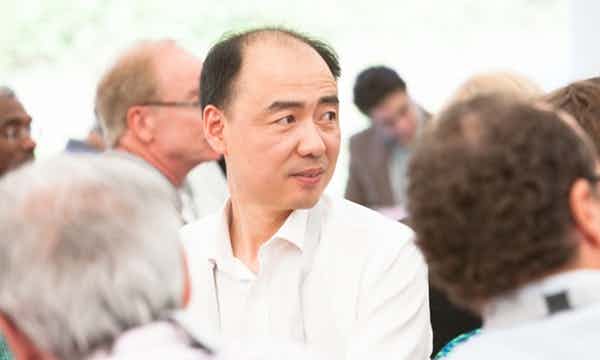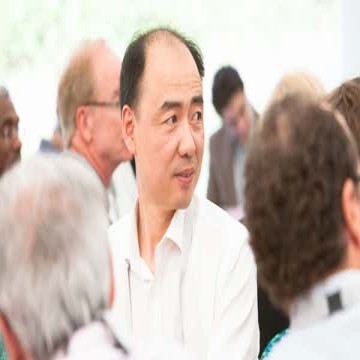Ma Jun: China has reached its environmental tipping point
Tom Levitt
the Guardian
It was almost 20 years ago that Ma Jun sat and watched the rainbow-coloured River Fen, in Shanxi province. As he turned to the skies in this coal and industrial heartland of north China he could see dozens of chimneys bellowing out their fumes.
He had been sent to the province on an assignment while working as a researcher for a foreign journalist in the late 1990s. The story then was about family planning and its impact on local communities, but it was the devastating pollution he witnessed that filled up his notepad.
It was these notes that would later form the basis of his first book, China's Water Crisis, which quickly came to signify the awakening of China's environmental consciousness - compared to Rachel Carson's Silent Spring in terms of its impact.
For Ma, now one of China's most prominent environmental voices, that book and his time along the Fen River was the beginning of a two decade-long journey in raising awareness of Chinaâs environmental crisis. It is one that has mirrored an ongoing and gradual acceptance within his homeland of the need to tackle the chronic levels of pollution caused by rapid and unchecked industrial growth.

In the last few years, officials have belatedly acknowledged the crisis with a series of reports. The findings confirmed Ma and other environmentalistsâ worst fears. One-fifth of farmland is too polluted to grow crops, nearly 60% of groundwater is unfit for human use and air pollution is 20 times the recommended safe levels.
The human cost of this damage has been devastating: huge swaths of productive arable land taken out of food production over fears of rice contaminated with heavy metals, more than 450 so-called 'cancer villages' where untreated or mistreated chemicals have polluted local communities, choking levels of air pollution causing underweight babies, rising levels of lung cancer and a decline in male fertility.
It is not unsurprising to discover that environmental issues are now the number one cause of public protests in China - overtaking land and labour issues.
After decades of growth at all costs, Ma says China is now at a tipping point. âThe development and growth model of the last 35 years has been increasingly dependent on energy and pollution-intensive industries, but how can we go on growing all these sectors every year with double digits?
"I think its time to change and balance the environment and growth. If we donât do that weâre going to suffer a hard landing one day very soon," says Ma.
China's leadership has promised a 'war on pollution' to regain public trust, but it is the decisions of local government officials, says Ma, that dictate what action, if any, is taken against major polluters.
"It's the local environmental officials that are in charge of enforcement, but they are subordinate to local government. Their heads are appointed by local government. Those who want to stick to the laws could be replaced. This is the very harsh reality. It won't be easy to change that."
What can business do?
"This lack of enforcement poses a dilemma to the business community," says Ma. "When you have an situation where the laws are there but the enforcement is not quite there, then youâre basically rewarding those who cut corners and hurting those who try to be responsible."
"When I've spoken to factory owners they say, "Well look, if I choose to not do this and not discharge the heavy metals but my neighbours do then I could be in a difficult situation in the market because the profit margins are often so tight."
"And then to add insult to injury, the owners say, the big national brands come in and care only about the cost. They just buy from the cheapest. They don't care at all about the environmental pollution. If we have a high cost, we lose the contract. We collapse. So how can we act in a responsible way?"
For Ma it is the active participation of citizens that will be key to forcing local government and industry to act. It was this belief that led him to set up one of China's most respected NGOs, the Institute of Public and Environmental Affairs in 2006, now backed by funders including the Alibaba Foundation (set up by internet billionaire Jack Ma). From here he has worked on making official pollution data more easily available to the public, 'lifting the veil' on the worst offenders as one commentator described it.
He has already had success in getting multinationals like Apple, Hewlett-Packard, H&M and Gap to root out the worst polluters from their supply chain in China. âWe canât go to courts in China, so we have to find alternate ways, like working with brands to try and create a level playing field by identifying the most obvious polluters.â
Citizen empowerment
A much more high-profile success story for Ma and the IPE has been a map and app that allows users to search for pollution violations by company name and location.
The Blue Map app became an overnight internet sensation earlier this year after the release of the documentary Under the Dome, which revealed how environmental officials felt powerless to clean up Chinaâs air pollution. Within weeks Maâs app had leaped from 100,000 to 3m downloads, despite the film being quickly pulled from internet sites by Chinese officials.
The aspiration for a blue sky was to inspire more to people to download and use the app, giving them a weapon to clean up polluting factories.
The data behind the app was made possible by the Chinese government's willingness to make the data from its real-time monitoring of emissions available to the public. A move that surprised many, says Ma.
"For me there is no better progress sign of than the requirement for the real-time disclosure. The very fact that government decided to empower the people to join the efforts is a remarkable change although many times itâs not talked about," he says.
"Transparency is still seen as subordinate to regulation, but actually it is of equal importance. It can drive a different kind of corporate behaviour and bypass deep-rooted barriers. It has been proven in the US and Europe. Now it's our turn."
For Ma, citizens are the best adjudicators of the growth path China pursues. "We need to mobilise the people to support them [environmental officials] because the real beneficiaries of what they do are the people. If the people aren't going to back them then who else will? Everyone else has some interest in economic growth and development, which often happens at the expense of the environment and community. We need the other side to join this to check and balance," says Ma.

